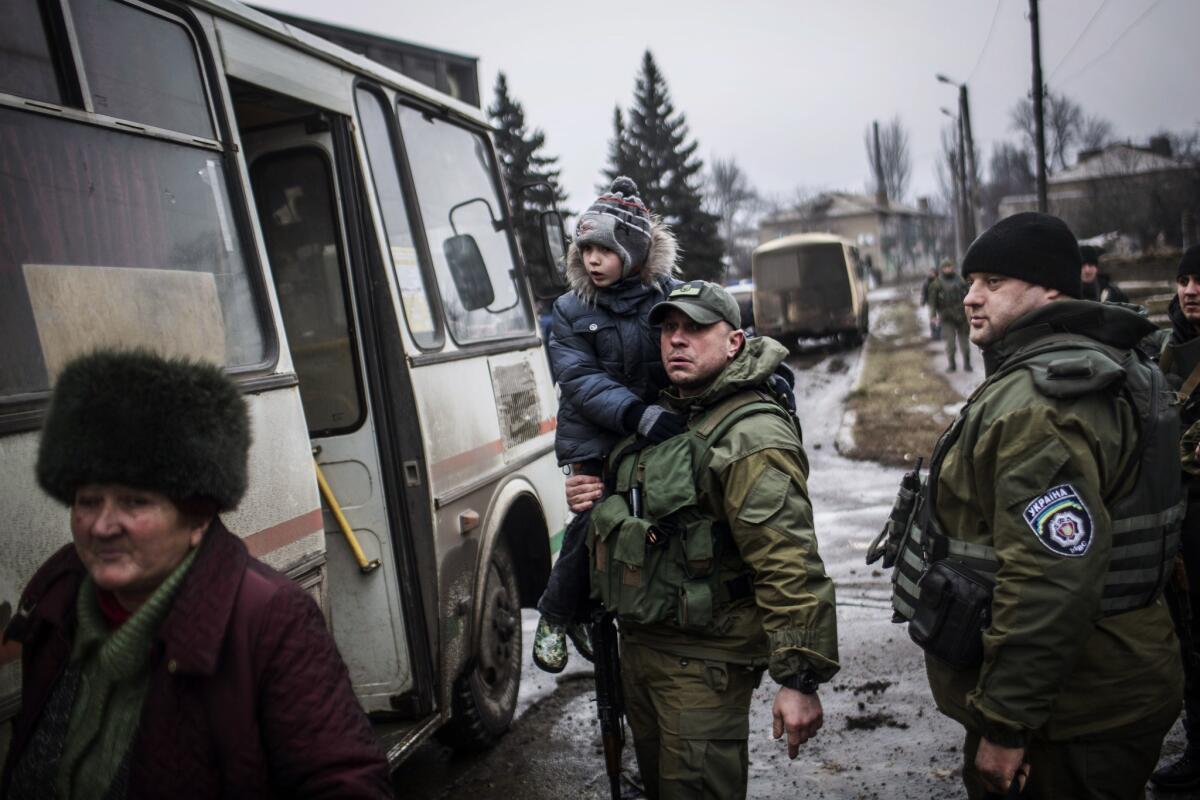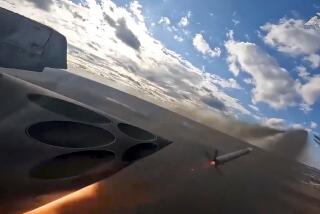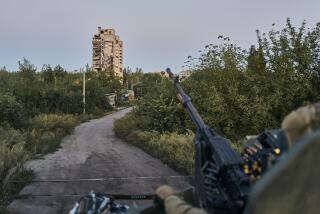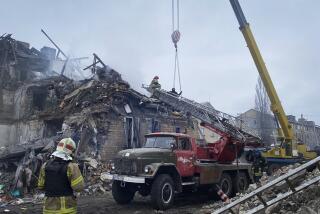U.N. criticizes both sides in Ukraine conflict over civilian deaths

Ukrainian government troops and pro-Russia separatists are increasingly engaging in “indiscriminate shelling” that has killed at least 224 civilians over a recent three-week period and imperils millions living in the eastern Ukraine war zones, the United Nations’ top human rights official said Tuesday.
U.N. High Commissioner for Human Rights Zeid Raad Hussein criticized both sides in the 10-month-old conflict for transforming residential areas into dangerous battlegrounds.
Hussein also reported an escalating death toll, saying that by “conservative estimate” based on confirmed casualty figures at least 5,358 have been killed and 12,235 wounded since last April.
The world body’s criticism follows recent efforts at a massive mobilization by both sides fighting over eastern Ukraine territory since the ouster of Ukraine’s Kremlin-allied President Viktor Yanukovich nearly a year ago.
Russian President Vladimir Putin has been accused by the Ukrainian government and its Western allies of arming and instigating the separatists. Kremlin officials deny that they are involved, but captured Russian fighters and the Moscow-allied leaders of the nationalist-occupied areas have confirmed that they were supported by the Russian government.
The North Atlantic Treaty Organization has also documented via satellite imagery invading columns of Russian tanks and troops moving into eastern Ukraine.
Hussein called on the combatants to respect international law that prohibits the targeting of populated areas.
“Bus stops and public transport, marketplaces, schools and kindergartens, hospitals and residential areas have become battlegrounds in the Donetsk and Luhansk regions of Ukraine, in clear breach of international humanitarian law which governs the conduct of armed conflicts,” Hussein said, disclosing the new casualty figures from the three-week period that ended Sunday.
He noted that 31 people were killed and 112 wounded in two rocket attacks last week on Mariupol, a major city on the Sea of Azov that the separatists appear to be targeting in an effort to control a supply corridor to the Crimean peninsula, which Russia seized from Ukraine and annexed 11 months ago.
Hussein, in a statement issued from his office in Geneva, warned that further escalation “will prove catastrophic for the 5.2 million people living in the midst of conflict in eastern Ukraine.”
The U.N. refugee agency reported Tuesday that it has seen a dramatic increase in the number of civilians fleeing the embattled regions, which are suffering food shortages and frequent power and water outages.
A separatist-controlled news agency said Tuesday that more than 3,000 people had fled the Donetsk region over the last week as fighting intensified for the town of Debaltseve, a key railway hub the separatists want to secure reliable delivery of supplies and reinforcements between the two areas of eastern Ukraine that they control.
Separatist leaders have called for mobilization of tens of thousands more fighters after abandoning peace talks with the Ukrainian government. Authorities in Kiev, the capital, also have signaled a major conscription effort and announced restrictions on foreign travel by draft-age men.
The separatists began occupying eastern Ukraine government buildings in April, apparently inspired by the Kremlin’s dispatch of thousands of paratroopers to take control of the Crimean regional government and parliament a month earlier.
Putin wanted Ukraine to join his Eurasian Economic Union, an alliance of former Soviet republics he has created in an attempt to rival the European Union. Under pressure from the Kremlin, Yanukovich abandoned long-standing plans to seek an economic association agreement with the EU in November 2013, igniting a fierce pro-European rebellion that drove him from office three months later.
Since the loss of Russia’s loyal ally from the Ukrainian leadership, Moscow’s state-run media have whipped up distrust between the Russian-speaking minority in eastern Ukraine and the rest of the country. Ukraine’s new elected leaders are portrayed by Russian television, which is often the only broadcast seen in separatist-controlled areas, as neo-fascists bent on depriving the Russian minority of its linguistic and cultural autonomy.
Follow @cjwilliamslat for the latest international news 24/7
More to Read
Start your day right
Sign up for Essential California for news, features and recommendations from the L.A. Times and beyond in your inbox six days a week.
You may occasionally receive promotional content from the Los Angeles Times.







